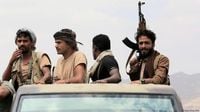On Sunday, August 31, 2025, the Iran-backed Houthi rebel group in Yemen escalated tensions in the war-torn nation by raiding United Nations offices in the capital, Sanaa, and detaining at least 11 UN employees. The incident, which saw armed Houthi security forces storming the premises of the World Food Program (WFP), the World Health Organization (WHO), and UNICEF, has sent shockwaves through the international humanitarian community and drawn widespread condemnation from global leaders and human rights organizations alike.
According to the Associated Press, the raids began early Sunday morning, with Houthi forces entering the offices, questioning staff in the parking lot, and seizing property—including data storage devices. Abeer Etefa, a spokesperson for the WFP, confirmed the incident and said both her agency and UNICEF were conducting a "comprehensive head count" of their employees in Sanaa and other Houthi-controlled regions to assess the full scope of the detentions.
UNICEF spokesperson Ammar Ammar echoed this, stating that several of the agency's staffers had been detained, and that UNICEF was urgently seeking more details from Houthi authorities. Reports from multiple sources, including DW and The Guardian, indicate that at least seven WFP staffers and three UNICEF employees were among those detained, though the precise number may be higher as the situation develops.
UN Secretary-General António Guterres issued a forceful statement late Sunday, condemning what he described as "forced entry into the premises of the World Food Program, the seizure of UN property and attempts to enter other UN premises in Sanaa." He demanded the "immediate and unconditional release of the personnel detained on Sunday as well as those detained in the past." Guterres's remarks underscored growing alarm within the UN over the safety of its personnel in Yemen, where humanitarian operations are vital for the survival of millions.
The timing of the Houthi crackdown is no coincidence. Just days earlier, on Thursday, August 28, 2025, an Israeli airstrike targeted a cabinet meeting of the Houthi's de facto government in Sanaa, killing Prime Minister Ahmed Ghalib al-Rahawi and at least 11 other top officials. Among the dead were high-ranking ministers responsible for sports, culture, foreign affairs, social affairs, electricity, and agriculture, as well as a powerful deputy interior minister, Abdel-Majed al-Murtada. According to Houthi officials and the families of the victims, the Israeli strike hit during a "routine workshop held by the government to evaluate its activities and performance over the past year."
The loss of al-Rahawi, described by Yemen analyst Ahmed Nagi of Crisis Group International as a technocrat, is viewed as a serious setback for the Houthi administration, even though it is not expected to alter the group's military posture. Nevertheless, the attack has clearly rattled the Houthi leadership, prompting vows of revenge and a sweeping internal security crackdown. Over the weekend, security was tightened across Sanaa, with Houthi leader Abdul Malik al-Houthi warning in a televised address that "anybody suspected of being a spy for Israel would be punished."
UN envoy for Yemen Hans Grundberg expressed "great concern" over the Israeli strikes and the subsequent detentions, urging all parties to de-escalate. "Yemen cannot afford to become a battleground for a broader geopolitical conflict," Grundberg said in a statement on Monday, September 1, 2025. He called for "the immediate and unconditional release" of the detained UN staffers and reiterated the UN's commitment to securing their freedom.
The raids on UN offices are only the latest in a troubling pattern of Houthi actions targeting aid workers, civil society activists, and even former employees of the shuttered US Embassy in Sanaa. Human rights organizations, including the US-based Association Maonah for Human Rights and Immigration and the Yemen-based Yemeni Network for Rights and Freedoms, noted in a joint statement this week that 34 UN staff remain detained by the Houthis, with 23 of them held for years and at least one dying in custody. The Yemen Network for Rights and Freedoms has documented approximately 2,678 cases of forced disappearances in Houthi-controlled areas between January 2018 and April 2025, including politicians, media workers, civil society activists, lawyers, and academics.
"Alongside the detention of hundreds of activists and political opponents, [this] represents a flagrant breach of international humanitarian law," the organizations stated. The Houthis themselves have claimed that some of those arrested are members of "an American-Israeli spy ring" operating under the cover of humanitarian agencies. This assertion, however, has been widely dismissed by international experts and observers as a pretext for consolidating power and bargaining with foreign governments.
Yemen expert Mohammed al-Basha, who runs the US-based risk consultancy Basha Report, predicted in a newsletter to clients that "the Houthis will launch a major internal security crackdown" following the Israeli strike. He warned that "the crackdown will also extend to staff of INGOs, NGOs, and foreign embassies in Sanaa, as well as banks, money transfer companies, and currency exchange shops." Al-Basha confirmed to The New York Times that anyone linked to international organizations risks being targeted by the Houthis, especially in the current climate of heightened paranoia and suspicion.
This cycle of arrests is not new. In January 2025, eight additional UN staff were kidnapped by the Houthis, prompting the UN to suspend its operations in Saada, northern Yemen. The abductions often coincide with moments of geopolitical tension, and experts such as Abdulghani al-Iryani of the Sanaa Center for Strategic Studies suggest that UN workers are seen as valuable bargaining chips. "The Houthis picked up the UN staff because they are more valuable for negotiating a deal," al-Iryani told DW earlier this year, as the US considered designating the Houthis a terrorist organization.
The broader context is Yemen's devastating civil war, which has raged since 2014 and left the country divided between Houthi-controlled northern regions and a Saudi-backed government based in Aden. The conflict has spawned one of the world's worst humanitarian crises, with the UN estimating that around 21 million Yemenis regularly require aid. Houthi forces, who have long accused international organizations of espionage, have intensified their crackdown on perceived dissenters, detaining civilians, aid workers, and even members of their own ranks amid fears of infiltration.
Meanwhile, the Houthis have vowed to escalate their attacks on Israel and shipping in the Red Sea. In July, the group threatened to target merchant ships belonging to any company that does business with Israeli ports, regardless of nationality. "Our military approach of targeting the Israeli enemy, whether with missiles, drones or a naval blockade, is continuous, steady, and escalating," Abdel Malik al-Houthi declared in his Sunday address.
As the region braces for further instability, families of the detained UN staff, humanitarian organizations, and diplomats around the world are anxiously awaiting signs of progress. The scheduled funeral for the slain Houthi leaders on Monday, September 1, 2025, in Sabeen Square is expected to draw large crowds and could mark another flashpoint in Yemen's ongoing turmoil. For now, the fate of the detained UN workers remains uncertain, a stark reminder of the perils facing those who risk their lives to deliver aid in conflict zones.




